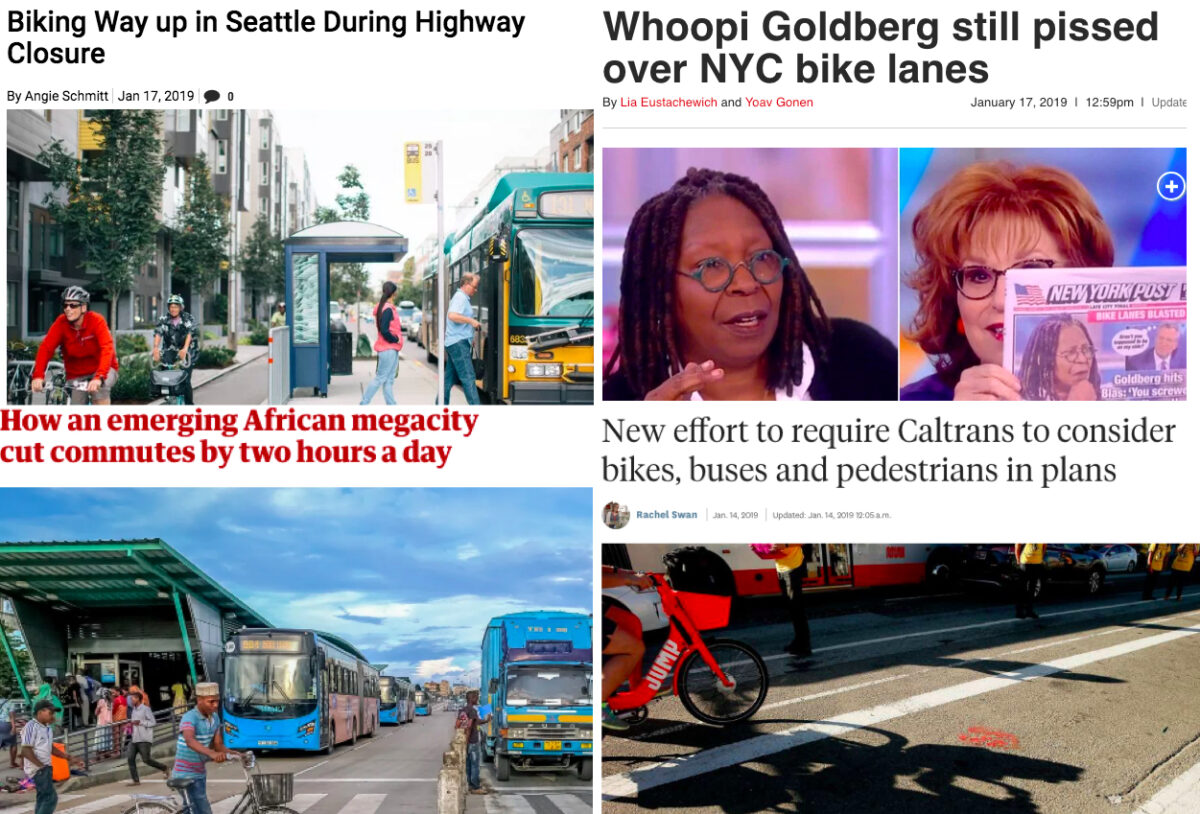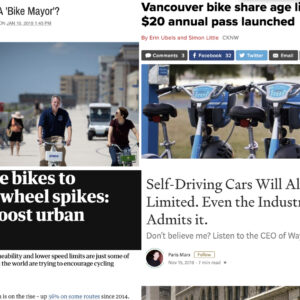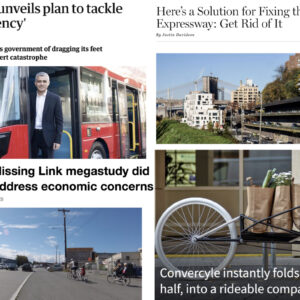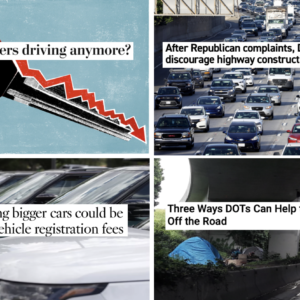Welcome to Monday.
This week’s Monday Roundup is sponsored by the Worst Day of the Year Ride, a classic Portland event with three route choices that happens February 10th.
Here are the most noteworthy items we came across in the past seven days…
Another front of the war on speed: Streetsblog reports that the National Committee on Uniform Traffic Control Devices voted last week to require cities to include “pedestrian and bicycle activity” when setting speed limits (yes it’s sad this is considered a major breakthrough).
E-bike on fire: The battery in an Australian man’s electric-powered road bike caught fire during a ride. The fire also detonated CO2 canisters in his saddle bag.
Put a lid on it: Portland isn’t the only city looking to cap I-5. Seattle’s Lid I-5 campaign is looking for a multi-disciplinary team to figure out the best lid design for over 12 acres of the freeway.
Bikes on transit in DC: The Washington Post says a new policy to allow bicycles on Metro trains has worked out fine so far — despite concerns it would cramp quarters and make riders uncomfortable.
Stop state hate: A California lawmaker is so tired of his state DOT (Caltrans) marginalizing the needs of bicycle riders, transit users, and walkers, that he’s introduced legislation to force their hand.
Commuters are polluters: It’s good to see national political media pointing out that climate change policy must tackle the largest source of greenhouse gas emissions: cars and trucks. Now let’s hope Oregon lawmakers take heed.
Advertisement
BRT in Africa: Dar es Salaam, the burgeoning capitol city of Tanzania, has tamed its crazy congestion with a simple tool that Portland has yet to fully embrace: Bus Rapid Transit.
Biking and mental health: Urbanism scholar Robin Mazumder wrote on Medium about how riding a bicycle is key to his mental well-being.
The Whoopi Goldberg thing: The actress and talk show host railed against bike lanes in a high-profile debate about transportation policy with NYC Mayor Bill de Blasio on The View.
Biking “Viadoom”: Seattleites have responded to the shutdown of SR 99 by bicycling a lot more and generally finding other ways to get around. Maybe they don’t need a massive freeway through their city after all?
— Jonathan Maus: (503) 706-8804, @jonathan_maus on Twitter and jonathan@bikeportland.org
Never miss a story. Sign-up for the daily BP Headlines email.
BikePortland needs your support.








Thanks for reading.
BikePortland has served this community with independent community journalism since 2005. We rely on subscriptions from readers like you to survive. Your financial support is vital in keeping this valuable resource alive and well.
Please subscribe today to strengthen and expand our work.
I can’t recall ever hearing of a human powered bike catching fire. It is salutary, I think, for users of these bikes occasionally to experience some of the dangers, risks, ramifications of the lithium lifecycle, which, mostly is hidden out of sight, upstream.
https://www.wired.co.uk/article/lithium-batteries-environment-impact
from the Monday Roundup linked article:
“It is recommended that owners of products which use large lithium-ion batteries – which includes drones and many other consumer products as well as e-bikes – should use battery storage containers with a certified lithium extinguishing system or a storage room equipped with an integrated automatic extinguishing system that would include a heat and smoke detector. Charged and spent batteries should be stored in fireproof bags or boxes.”
#Ivan Illich
Lithium batteries, and any consumer product really, should be made to the standard of not burning their user or the user’s property when used as intended. The problem is not lithium battery technology as evidenced by the now millions of electric vehicles traveling the world’s roads every day without catching fire but poorly engineered and cheaply manufactured batteries which attempt to pack as much charge at the least possible cost to look good on a spec sheet. Manufacturers should be held liable. If you can’t make your product safe, then don’t make it at all.
The Wired article you referenced is really a condemnation of the existing political and economic order rather than lithium battery technology. What is oil’s impact on the environment and society? What about agribusiness? What about the military?
Lithium battery technology has matured beyond charge / discharge fires. We know how to make lithium batteries safe and we also know what makes them unsafe. Examples like this fire are the result of people KNOWINGLY making unsafe products for the sake of profit.
“What is oil’s impact on the environment and society? What about agribusiness? What about the military?”
Precisely. None of this is salutary, defensible.
The reason I’m hung up on lithium is that, the technologies into which it is packaged are currently cheered by most of our friends. We fall over ourselves to celebrate them as solutions to society’s ills, which says more about us than about their sustainability. Like those sectors you list lithium is a toxic, finite, environmental and humanitarian dead end, not something we should celebrate.
“The problem is not lithium battery technology … but poorly engineered and cheaply manufactured batteries”
Very convenient for you to limit the scope of what you are willing to consider a problem to the consumer’s slice of the life cycle.
“The Wired article you referenced is really a condemnation of the existing political and economic order rather than lithium battery technology.”
If that is your takeaway then you don’t understand biophysical limits, didn’t read the article very carefully. Although capitalism tries to deny this every day, there is such a thing as enough, overshoot, too much, running out, regret, folly. Power, exploitation, greed, and inequality are not readily separable from these limits.
You and I share the same concerns which is why I dislike this kind of Judean People’s Front vs. People’s Front of Judea bickering.
The point I would make is that everything needs to be judged against everything else. If you have cancer, then chemo is a viable option. Of course any resource extraction is terrible and we should minimize it but lithium is replacing oil and unlike oil, lithium is reusable and it happens to be a very abundant element in the earth’s crust.
It is also likely to be a gateway technology to getting vehicles electrified until a better, lower environmental impact and higher energy density technology comes along. Of course, we should be reducing personal vehicle use and promoting walking & bicycling but lacking that or in addition to that, as a parallel effort, I would much rather people drive electric cars charged with renewables than filled with prehistoric carbon.
“Of course any resource extraction is terrible and we should minimize it but lithium is replacing oil and unlike oil, lithium is reusable and it happens to be a very abundant element in the earth’s crust.”
That is a very generous and wishful characterization. Reusable? In theory everything except energy is reusable. In practice as we’ve had occasion to learn, not so much.
“It is also likely to be a gateway technology to getting vehicles electrified until a better, lower environmental impact and higher energy density technology comes along.”
That is certainly the party line.
“Of course, we should be reducing personal vehicle use and promoting walking & bicycling but lacking that or in addition to that, as a parallel effort, I would much rather people drive electric cars charged with renewables than filled with prehistoric carbon.”
As Amory Lovins put it now more than forty years ago: “A society cannot aspire to be both conspicuously consumptive and elegantly frugal. The hard and soft paths are culturally and institutionally antagonistic, and furthermore, compete for the same limited resources.” (The Energy Controversy: Soft Path Questions & Answers, p. 5)
While I strongly support the efforts in California to put in place a version of Oregon’s (almost never followed these days) bike bill and want them to go much further, I am troubled by the continued misrepresentation of history. While it is true that car use boomed in the 1950’s, the streets of San Francisco and much of the rest of the Bay Area were also packed with people on bikes for many years after that. Bicycle use didn’t really die off until the SUV era began in the ’80’s. The year with the most units of bicycles ever sold in the US is still 1974 even though our nation had a hundred million fewer people.
Most people currently alive have lived their entire lives in the dark ages of cycling. I accept that, but let’s not pretend that Rome fell earlier than it did. We’ve had three bike booms, the late 1800’s, the ’60’s-’70’s and the naughties (Armstrong boomlet), with the second one being the biggest. Horrid CalTrans even had a bicycle division in the ’70’s under Gov. Moonbeam (nickname used with great affection; Moonbeam was so much more progressive than Gov Jerry Brown).
“Similarly, the only report that currently outlines what a Green New Deal might look like, from think-tank Data for Progress, calls on the country to “modernize urban mobility and mass transit,” but has nothing to say about curtailing the federal highway program.”
Even the “left” is seemingly incapable of criticizing our car- and truck-centric transportation system.
The left wants to think (hopes) there are relatively painless (capitalist-compatible) solutions to the mess we’ve saddled ourselves with.
Every day, every month, every year we continue to dawdle decreases the probability of that wishful fantasy coming true.
The further left wants a dictatorship, which is the only alternative proffered to relatively painless (capitalist-compatible) solutions.
?!
A corporate nonprofit 501c3 dictatorship of the mechanistic masses of freewheeling cassettes. Remember, you have nothing to loose except your chains!
If you go far enough out in the tail of the normal distribution you’ll find everything, but what is your point? What significant group of leftists is calling for a dictator? Most of us would settle for campaign finance reform and an end to capricious voter suppression. I’d also be amused if government officials had to wear coveralls with their sponsors’ logos but I’m not holding my breath.
I was referring to the “just do it”, “skip the process” crowd. They may not be literally calling for a dictatorship, but that’s what it amounts to.
I agree with you on the campaign finance reform (which I can at least understand the other side), and voter suppression, which I simply find disgusting.
So if that’s a dictatorship, what do you call the current process where vested interests (including those that make their money off of car use) drive policy decisions – and when they can’t do so directly, spend some of their piles of money on misleading attack ads to drive public opinion their way?
Oh right, that’s the textbook definition of fascism.
I think there’s a balance to be struck between doing what we know is the right thing and having absolutely every nuance of public policy of getting voted on. Having lived in both Seattle and Portland, I can tell you firsthand the primary reason Portland has its extensive MAX system and Seattle has lagged a couple decades behind. It is precisely because policymakers in Portland didn’t put every rail line up for a regional vote (same as we don’t put every freeway project up for a regional vote), whereas Seattle always did so – with a legacy of failed transit ballot measures from 1995 all the way back to the 1920s.
In Portland, policymakers knew transit was the right thing to do, even if each project might not have won if it had gone up for a vote and given opponents the chance to spend millions of dollars swaying public opinion against it. They didn’t “skip the process” – each MAX line has still taken years of planning, and plenty of public process – but they did “just do it”.
I would also say that generally, that’s why Portland as a city works better than Seattle: the latter is a little too process-oriented, and if often keeps things from getting done, because one of the adages my friends and I often came to learn in this: in Seattle, everything is controversial. You have to involve the public in your decisions, but again some sense of balance is required.
>>> I think there’s a balance to be struck between doing what we know is the right thing and having absolutely every nuance of public policy of getting voted on. <<<
I agree 100%.
As a point in fact, as far as I know, every rail line in Portland has been voted on, and not all passed.
I've said this before: "just do it" is great as long as those just doing it are doing what you want. But when you take away the ability for those who oppose your projects to do so, you also give up your right to oppose project you object to.
I'll happily live under a dictatorship, so long as I'm dictator. I'd be a lot less happy to have you (or anyone else) do the job. Likewise, I'd rather have good public process, consistently applied, than have the ability to ram through my projects/policies today while leadership has my ear.
Further to this https://bikeportland.org/2018/09/20/after-20-years-portlands-bike-parking-code-set-for-major-refresh-287535, the planning meeting is tomorrow, Public Hearing: Tuesday, January 22, 2019, at 5:00 p.m. Location: 1900 SW 4th Ave, Suite 2500 (2nd floor). Link: https://www.portlandoregon.gov/transportation/70439
Boycott Whoopi!
I would consider that, but it would require her to be appearing in movies. Zing!
Whoopi is so irrelevant now days so who cares what she says. But like all wealthy elitists she is good at dictating to others while living behind wealth and gated communities.
Semi-retired successful person opposes change. Is this a story?
I can’t recall ever hearing of a human powered bike catching fire. It is salutary, I think, for users of these bikes occasionally to experience some of the dangers, risks, ramifications of the lithium lifecycle, which, mostly is hidden out of sight, upstream.
https://www.wired.co.uk/article/lithium-batteries-environment-impact
from the Monday Roundup linked article:
“It is recommended that owners of products which use large lithium-ion batteries – which includes drones and many other consumer products as well as e-bikes – should use battery storage containers with a certified lithium extinguishing system or a storage room equipped with an integrated automatic extinguishing system that would include a heat and smoke detector. Charged and spent batteries should be stored in fireproof bags or boxes.”
#Ivan Illich
Recommended 0